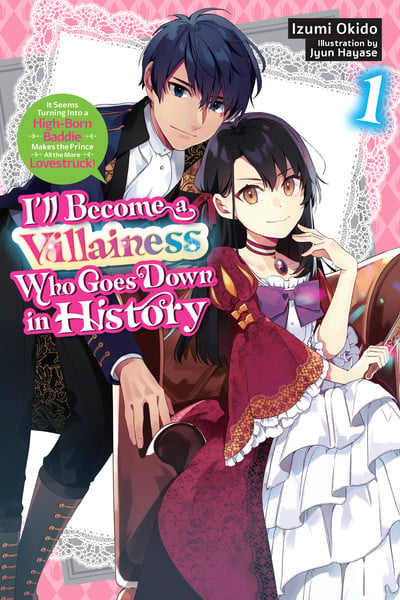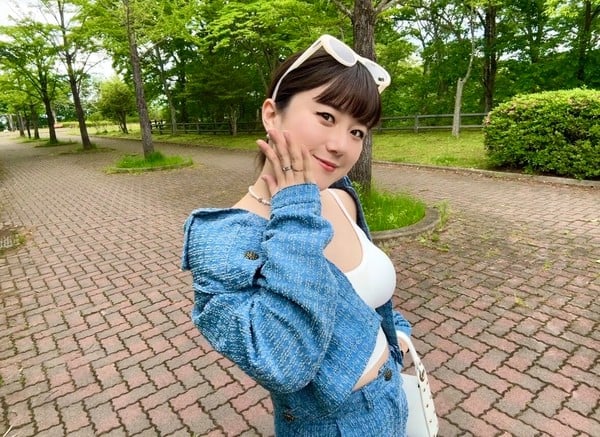Deconstructing Villainesses and Heroines: An Interview with I'll Become a Villainess Who Goes Down in History's Author, Izumi Okido
by Richard Eisenbeis,To say there is an ongoing “villainess” boom in light novels, manga, and anime would be an understatement. One such story is I’ll Become a Villainess Who Goes Down in History, which got an anime adaptation in fall 2024. To get a peek behind the curtain about what it takes to make a successful villainess story, Anime News Network sat down with the creator of the story, light novel author Izumi Ōkido. In our hour-long chat, we talked about her thoughts on how her story twists the standard villainess sub-genre formula, her impressions of the anime adaptation, and why she decided to write a villainess story in the first place.

On a thematic level, I’ll Become a Villainess Who Goes Down in History is a story about the value of giving your all regardless of the results. “It's right there from the very first line in the original novel—that hard work doesn't always pay off,” Okido told me, detailing her philosophy. “I think that effort is something that gives you confidence—or something that nourishes you in your life—but it doesn't always lead to results. 'If you keep trying, your dreams will come true': I don't like that way of thinking. In the end, there are times when you don't get rewarded, but if you make an effort, the path you are on becomes clearer or more defined.”
This is the lesson Okido herself learned while writing the first novel in the series. She was a high schooler studying for her college entrance exams, and things weren't going well. “[When I failed my entrance exam], I thought about what I was studying for when I realized that not everyone who studies hard gets accepted into a university,” Okido said to me. “And while I continued taking other entrance exams, I started writing novels—and somehow I became popular.”
“The fact that my beliefs at that time are included in the first part of the book is very appealing to me,” Okido concluded.
All the above ties into a surprising truth: despite being the author of a popular villainess story, Okido isn't a fan of villainess characters overall—well, not exactly. “I like people who are determined and can act,” Okido explained. “I think most protagonists in stories are people with strong convictions—or rather, people who have a clear idea of what they want to do and have the power to accomplish it. There aren't many who are weak or faint of heart—there aren't many who are wavering. I imagine these people being like, 'I want to do this! I'll do this! I'm doing this! I've done it!' I like such people, but I don't particularly like villainess characters.”

Alicia, the main character and titular villainess of the story, shares Okido's love of strong-willed people and wants to be a villainess who exemplifies those ideals—and who inspires others to live by the same hard-working philosophy. Alicia's convictions can be seen clearly through her work in the penal village of Roana. “What's different about Alicia is that if she goes and does everything for [the people of Roana], they'll end up relying on that—and nothing will have truly been fixed in the long run,” she told me. “But Alicia gives them a chance [to grow], and says that the only thing that can be changed is their skills and motivations, and so on.” Or to put it another way, Alicia is very much a person who follows the adage “Give a man a fish, and you feed him for a day; teach a man to fish, and you feed him for a lifetime.”
Of course, Alicia's hyper-focused nature also leads her into trouble with her personal relationships. A prime example is when she unilaterally decides to give one of her eyes to Will. “Alicia, from her point of view, had raised her magic level and trained, so it was like she'd done everything she could, and she was filled with a sense of accomplishment for having achieved her goal [of restoring Will's sight],” Okido said. “But from the perspective of other people, everyone who liked Alicia was worried, like, 'Why would she do something like that?'”
“I write things from Alicia's point of view, and I think a lot like Alicia. I don't understand the concerns of the people around me.” Okido continued, “I was writing it thinking, 'Would people in general be worried about me [if something similar happened]?'—I don't know what that feels like. What do you think? Do people around you worry?”
Alicia's choice to give up her eye also stems from some of Okido's deeply-held personal beliefs: “I know I'm being a bit egotistical saying this but I feel like if someone is in trouble because they don't have something, then someone should give it to them without making a big deal about it. That's my philosophy.”
While the choice to have Alicia give up an eye makes sense both thematically and in character, I wondered if Okido had worried about how fans would react to such a major change in her character design. Her answer was quick and simple. “I didn't think about that at all,” she laughed. “Not at all.”
Of course, Alicia is only one part of I’ll Become a Villainess Who Goes Down in History's winning formula. After all, how can you have a villainess without a heroine? “[With Liz and Alicia], I wanted to create a conflict between two ways of thinking. The heroine is quite idealistic, and Alicia is a realist. There are pros and cons to both sides, but I just wanted to have them clash on that basis,” she told me. “So I didn't want to portray the heroine as evil, but rather, I thought there are different ways of thinking and reality and ideals inevitably clash, right?”
All that said, Okido is hesitant to call them rivals in the traditional sense. “It's like they're from different countries,” she explained. “They each have their sense of justice—they clash, but it's not going to turn into a war or anything.”
What's interesting is that the two do view each other as rivals, though for completely different reasons. “Liz likes Duke and sees Alicia as a rival in love, but Alicia sees Liz as a rival in terms of abilities, and so on—so they see each other as rivals in some way, but the nature and essence of their rivalries are different. Maybe that's why it works [in the story].”
What makes Liz such a compelling foil for Alicia is that she pushes the innocent heroine archetype to its maximum limits. “Liz hasn't been exposed to evil. She's pure and innocent—ignorant of evil. If you're an adult, you're going to be tossed around in society, and your worldview will become distorted—everyone's world is different. It may be that Liz is just a little more pure, and that's why she can keep chasing her ideals.” Okido told me.
“I think it's good to have ideals, but Liz is the one who takes those ideals to the extreme. [...] Liz is the one who only sees the beautiful parts of the world, but Alicia is the one who says that the world won't move forward unless you see the ugly parts too. I feel like I built Liz's personality just to showcase those extremes.”
In a more metatextual sense, Liz is Okido's response to the innocent heroine archetype. “I feel like the world isn't that easy, and when you go out into society, everyone wears different masks. People wear one mask in front of their parents, and they put on a different one in front of their lovers. Everyone has had a multifaceted life. But Liz hasn't had that experience at all. She's the type of person who can't act in a calculating way. I'm the type of person who wants to live calculatedly, so I don't dislike her, but I don't like her either.”
However, this doesn't mean Liz is a one-note character, incapable of change. “I've heard her described as 'like a psychopath.' She believed in what she was saying. From the first moment you meet her, you get this cult-like feeling. She believed everyone could be happy. She truly is a girl from a fairy tale land,” Okido told me. “But she asked Alicia for help understanding and was told all sorts of things. Liz is trying to grow up to face reality and not be blind to it.”
As the conversation moved on, we talked a bit about her novels being adapted into manga and anime, and the cuts and additions made in the process. “The story changes quite a bit between the comics, anime, and the original novel, but it's like 'an expert is an expert'. I'm not a professional [manga artist or anime director], so I don't feel I have any say in it,” Okido said, detailing her philosophy on adaptations. “As long as the main story doesn't change, they could make it how they like.”
“Each version has its own merits. This is true for the anime, too. I didn't say that there was anything in particular that I wanted them to incorporate. I just left it up to them,” she continued. “The original work has less romance than the anime. Still, I could enjoy the romance included in the anime. I thought it was great.”
As the interview drew to a close, I asked her, as the author, which scenes she had written were her favorites. “I like the scene where Alicia gives her eye to Will and the scene where she cuts her hair,” she gushed. “They left the biggest impression on me when I was writing them.”
“I also like that scene [in the dining hall] where there is a line from Alicia to Duke where she says 'I'll protect you,' and it's like she's saying to him 'I'll be by your side and keep you safe.' While I was writing it, I thought, 'if it were made into an anime, I want her to reach out and tilt his chin up and everyone would think it was a great scene,'” Okido told me. “I think it's a scene that makes it pretty clear that Duke fell in love with Alicia because she has such a big heart. She loves Duke and has the capacity and heart to protect him, so I like that part as a love story.”
To cap things off, Okido had this message to fans of her work: “As the author, it brings me joy when you read or watch my work as entertainment that can make your life a little more fun or happy. Enjoy reading!”
The I’ll Become a Villainess Who Goes Down in History light novel series is published in English by Yen Press. Volumes 1 is available now, and Yen Press will release volume 2 on June 10.
The manga version is also available from Yen Press. The 13-episode anime series is streaming on Crunchyroll.
Disclosure: Kadokawa World Entertainment (KWE), a wholly owned subsidiary of Kadokawa Corporation, is the majority owner of Anime News Network, LLC. Yen Press, BookWalker Global, and J-Novel Club are subsidiaries of KWE.
discuss this in the forum (1 post) |